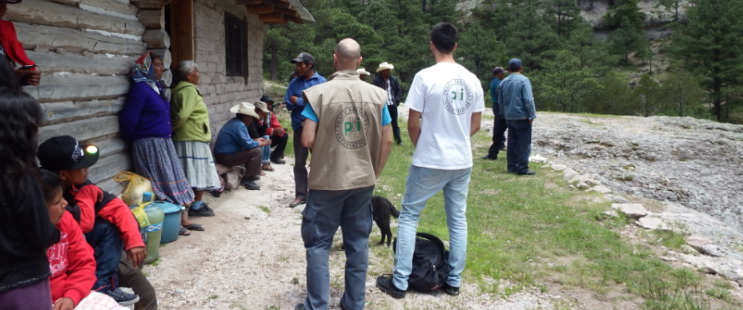
On April 24, join us to hear Diana Villalobos Diaz speak about the work of CONTEC in support of Indigenous communities in northwestern Mexico.
To register for this webinar, please click here.
Diana is a lawyer and the director of the PBI-Mexico accompanied Community Technical Consulting (CONTEC).
She will be talking about territorial struggles, self-determination for Indigenous peoples and the General Law on displacement.

In August 2016, PBI-Mexico accompanied CONTEC on a visit to San Elías Repechique that struggled against the TC Energy pipeline.
Territorial struggles against mining, logging and tourism
Diana has highlighted: “There are three major economic projects in the mountains, these are mining, forestry and tourism. These concessions granted by the Mexican state to mining companies and those of forest exploitation, is without the consent of the indigenous population that are the most affected.”
Along with CONTEC drawing attention to the dam spill at the Cieneguita mine it is accompanying Repechique in their struggle to protect their forests from logging on Rarámuri land claimed by Fernando Cuesta as his Pino Gordo property.
CONTEC has also accompanied Repechique as they struggled against the Barrancas del Cobre-Creel Regional Airport being built in their ancestral forest.
There is also the continuing struggle against the dispossession of 154 hectares from the Rarámuri community of Mogótavo, located in the Copper Canyon, in the municipality of Urique, Chihuahua to develop a tourist complex.

On May 29, 2021, PBI-Mexico accompanied a mobilization against a tourist complex by the Indigenous communities of Mogotavo, Bacajípare and Huetosachi, of the Sierra Tarahumara for the defense of life and ancestral territory.
Self-determination
In August 2021, PBI-Mexico accompanied CONTEC at a blockade on the Creel-San Rafael highway conducted by the community of Repechique to further their demand for legal recognition of their ancestral territory.

On August 8, 2021, PBI-Mexico accompanied CONTEC at the mobilization convened by the Raramuri forest community of San Elias Repechique, to which members of the communities of Mogotavo, Cuiteco and Tewerichi also came.
General Law on displacement
As of December 2020, there were approximately 357,000 internally displaced persons in Mexico, up from 8,000 people in 2009.
While some have been displaced by climate change and natural disasters, the majority have been displaced by organized crime groups fighting for control of territory rich in natural resources, including timber.
Social movements have called on the López Obrador administration to implement the necessary protection frameworks in this regard.
PBI-Mexico reports that the Mexican Commission for the Defense and Promotion of Human Rights has highlighted that Chihuahua is one of the states with most episodes of internal forced displacement in the country.
Webinar, April 24
To learn more about CONTEC and these struggles, please join us at a webinar on Sunday April 24 at 2:30 pm EDT.
You can sign up for that webinar here.

